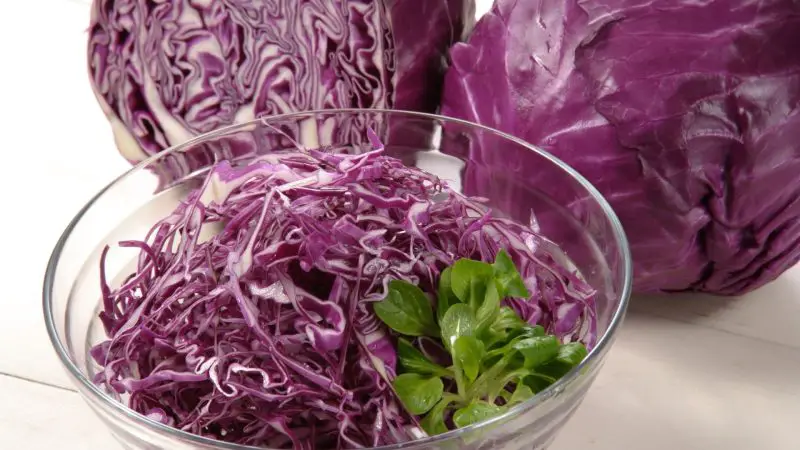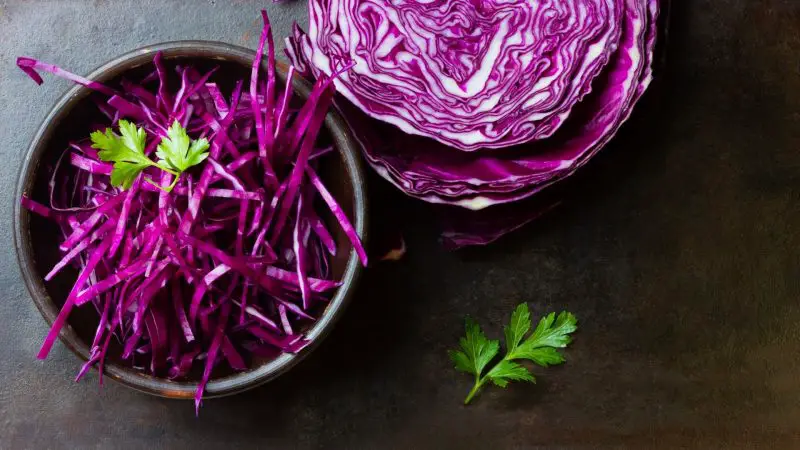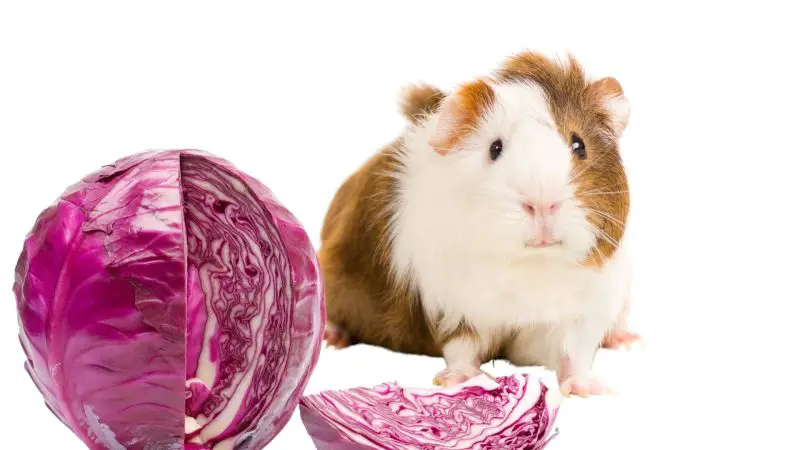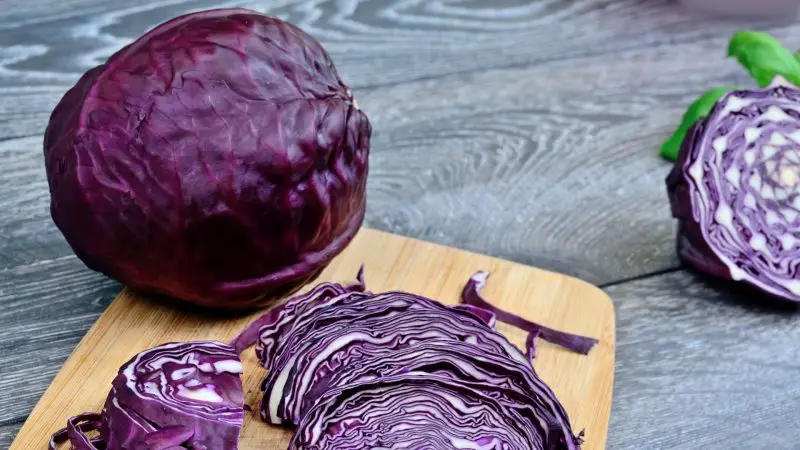Red cabbage is often used in cooking and in preparing salads. It has grown to be a favorite vegetable throughout the world, as it is mostly cultivated in America, China, and Northern Europe.
However, this veggie hasn’t been very common in some parts of the world, but it is slowly gaining more and more popularity.
Can guinea pigs eat red cabbage? Guinea pigs can eat red cabbage (purple cabbage). It is a nutritious and tasty vegetable filled with vitamin C, vitamin K, fiber, potassium, and antioxidants beneficial for the guinea pigs.
Red cabbage forms an ideal meal for a guinea pig. In this article, let’s look at other helpful information about guinea pigs and red cabbage.
Table of Content
Are Red Cabbages Good for Guinea Pigs? | Health Benefits

Red cabbage, also called purple cabbage, is good for guinea pigs. Below are several benefits attached to red cabbages:
Elimination of Free Radicals
Metabolic processes in the body cause free radicals. Some of these processes produce these radicals at high levels, which is inappropriate for guinea pigs. Free radicals can lead to cell damage, among many other effects in the body of a cavy.
In some cases, it can even lead to diseases and infections that can damage the well-being of a guinea pig. Red cabbage has sufficient antioxidants that aid in the fight against free radicals in guinea pigs.
One example of a potent antioxidant found in red cabbages is a flavonoid.
Prevents Cholesterol From Being Oxidized
Cholesterol is not harmful until it is oxidized. When it gets oxidized, it sticks on the walls of arteries and thus leads to heart diseases and complications.
The antioxidant known as flavonoid prevents this compound from oxidizing, thus saving the guinea pig’s heart and other vital body organs.
Aids Indigestion
Digestion is a process that guinea pigs often have difficulty with due to their weak digestive systems. This is why they need assistance when food gets to this stage. They also need help when it comes to extracting nutrients from food, and both of these processes are achieved by dietary fiber.
Red cabbage is rich in fiber, which aids in the processes mentioned and alleviates stomach-related issues such as constipation.
Contribute to Weight Loss
Due to the presence of dietary fiber, it is capable of helping with weight loss in guinea pigs. This is because dietary fiber is naturally a filler food, and for this reason, it will reduce the intake of food when eaten by guinea pigs.
When food intake is brought down, the overall amount of calories in the pet’s body also goes down, which leads to a significant control or loss of weight.
Reduce Inflammation
For those who don’t know, inflammation is a term that can refer to the swelling of body organs or parts due to infections, diseases, or injuries. It is a normal response by the body but can get to chronic levels if not handled correctly.
You can feed your guinea pig with this vegetable to prevent this from happening. You can deal with chronic inflammation by giving foods rich in antioxidants like red cabbage.
Boosts the Immunity
The presence of vitamin C in red cabbages ensures that guinea pigs have a robust immune system that can counter any disease or infection. Aside from boosting the immune system, this vitamin is equally a potent antioxidant that wards off free radicals.
Remember that red cabbage eliminates the threat of diseases, infections, and cell damage by dealing with free radicals.
Aid in Lowering Blood Pressure
When the pressure of blood in a guinea pig’s body is too high, this can cause complications that can risk the life of your cute little pet.
Red cabbage provides nutrients that can regulate blood pressure at optimum levels, thus lowering the chances of any complications. One mineral in red cabbages that aids in lowering blood pressure is potassium.
Development of Strong Bones and Teeth
Due to the presence of vitamin K in the vegetable, it can aid in the growth and development of strong bones and teeth for your guinea pig.
Nutrition Facts of Red Cabbage

Red cabbage is packed with several nutrients, including the following:
- Vitamin C
- Vitamin K
- Potassium
- Dietary fiber
- Folate
- Magnesium
- Calcium
- Manganese
- Anthocyanin
- Iron
- Vitamin A
How Much Red Cabbage Should Guinea Pigs Eat?

Red cabbage should be fed to your cavy in moderation. Preferably, a small amount for young ones and in moderate amounts to adult guinea pigs.
One to two small size of leaves will be fine. You can offer your pet a red cabbage twice or thrice a week.
Is Red Cabbage Bad for Guinea Pigs? | Risks to Consider

It is fair to say that red cabbage is a safe vegetable as it doesn’t have many risks for cavies except for the following:
- Indigestion and Bloating – Red cabbage produces too much gas that causes bloating and digestive problems and, for this reason, should not be given to guinea pigs in large amounts.
- Bladder Stones Formation – This vegetable contains calcium and can cause bladder stones and urinary problems if consumed in excessive amounts.
Here is a video about guinea pigs undergoing a bladder stones removal procedure caused by high calcium intake:
Quick Facts on Red Cabbage
The following are some of the fascinating facts about red cabbages that you probably didn’t know about:
- Red cabbage is also called red kraut, blue kraut, and purple cabbage, among many other names.
- Red cabbage is made up of red and purple leaves.
- China leads in cabbage production and is followed closely by Russia and India.
- Red cabbage and green cabbage have the same taste.
- When cooked with other foods, red cabbage ends up bleeding its color into the different meals.
- Cabbage exists in the Guinness book of world records for multiple entries.
- Red cabbage has several leaf structures and shapes.
With food, you should be careful what to choose. If you are not sure what to feed them but believe your little piggies deserve some great treats, check our Helpful Guide to the Best Guinea Pig Treats to get some ideas.
List of Sources
Heart Health – Vegetable of the Month: Red Cabbage
